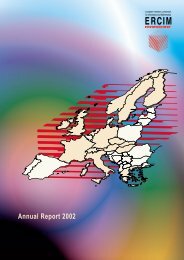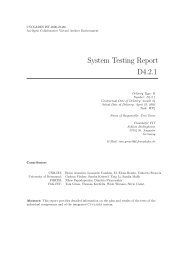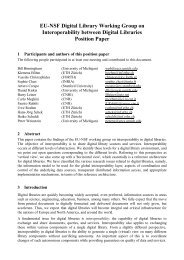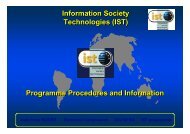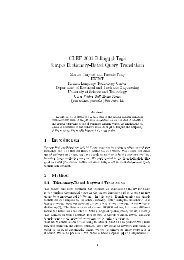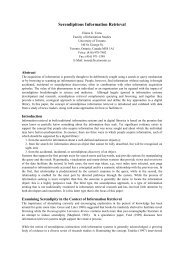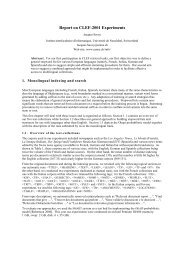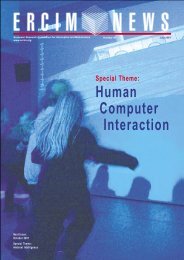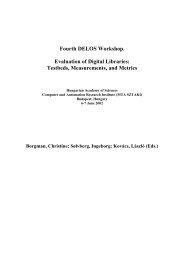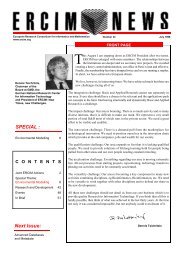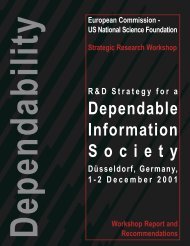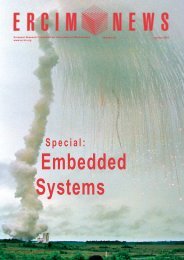Towards a Platform for Widespread Embedded Intelligence - ERCIM
Towards a Platform for Widespread Embedded Intelligence - ERCIM
Towards a Platform for Widespread Embedded Intelligence - ERCIM
Create successful ePaper yourself
Turn your PDF publications into a flip-book with our unique Google optimized e-Paper software.
cases with separate proposals, all of<br />
which are based on similarities between<br />
the entities - Trustor, Trustee, recommender<br />
and other entities connected to<br />
each other by a (social) network - or contexts<br />
attached to the entities. For<br />
example, the lack of direct in<strong>for</strong>mation<br />
about a new scientific conference does<br />
not stop the Trustor inferring trustworthiness<br />
by considering the reputation of<br />
the conference chair and favourable recommendations<br />
about the programme<br />
committee members and the conference<br />
proceedings publisher.<br />
Trust4All is a two-year EU-ITEA project.<br />
Trust4All aims to enhance dependability<br />
and trustworthiness of networked<br />
and component-based embedded systems.<br />
Trust4All project partners come<br />
from industry, research institutes, and<br />
academia: CWI, Océ –Technologies,<br />
Philips Research (the project coordinator),<br />
Telematica Instituut, Univ.<br />
Eindhoven (TU/e), Univ. Leiden (the<br />
Netherlands); Nokia, Solid In<strong>for</strong>mation<br />
Technologies, VTT (Finland); ESI,<br />
FAGOR, IKERLAN-Electrónica,<br />
Robotiker, Visual Tools (Spain).<br />
Digital Identity in Ambient Environments<br />
by Ben Schouten and Onkar Ambekar<br />
<strong>Embedded</strong> systems and ambient technology enable users to interact at any time<br />
and anywhere. In the BASIS project <strong>for</strong> identity management, CWI investigates<br />
transparent biometrics in home environments. Possible application areas are<br />
user profiling <strong>for</strong> shopping , listening to one's favourite music and operating<br />
gadgets and appliances in the home.<br />
Historically, personal relationships,<br />
face-to-face encounters, notaries, and<br />
third party counsel verified our identity.<br />
Nowadays, reliance on paper has shifted<br />
to electronic documents and in the same<br />
way, reliance on traditional trust factors<br />
has had to shift to electronic authentication<br />
<strong>for</strong> exchanging in<strong>for</strong>mation, goods,<br />
and services. As territories and communities<br />
are newly defined in the digital<br />
age, there is a need <strong>for</strong> a new definition<br />
of digital identity. The question is: Do<br />
we possess only one 'federal identity' as<br />
in our passport, or do we allow the use of<br />
partial identities, depending on the application<br />
we are using or on the relationship<br />
or community of which we are a part?<br />
(See Figure 1.)<br />
The research project Biometric<br />
Authentication Supporting Invisible<br />
Security (BASIS) tries to answer these<br />
questions. It aims to develop authentication<br />
protocols in networked and distributed<br />
systems and, in particular,<br />
studies robust face recognition in images<br />
from multiple cameras. Users will have<br />
an aware, adaptive and responsive personal<br />
space, in the home environment.<br />
The aim is to investigate the possibilities<br />
of biometric authentication <strong>for</strong> securing<br />
access to in<strong>for</strong>mation and services in this<br />
personal environment, with a focus on<br />
user convenience and privacy protection.<br />
The research project addresses three<br />
topics in the following work packages<br />
(WPs). The WP Transparent Biometrics<br />
is about transparent biometric authentication<br />
(read without taking any specific<br />
action) as a means to enhance user convenience<br />
- <strong>for</strong> instance, to automatically<br />
hear your favourite music. The WP<br />
Template Protection is about anonymous<br />
biometric authentication as a means of<br />
Partial identities<br />
Address<br />
Age<br />
Blood group<br />
Date of birth<br />
Diary<br />
Diet<br />
Drivers license<br />
Gender<br />
Insurance<br />
Likes and dislikes<br />
Name<br />
Nr of Children<br />
Place of birth<br />
Tax Income<br />
SPECIAL THEME: <strong>Embedded</strong> <strong>Intelligence</strong><br />
Application or Relationship<br />
Links:<br />
Telematica Instituut: http://www.telin.nl/<br />
VTT: http://www.vtt.fi<br />
EU-ITEA project Trust4All:<br />
http://www.win.tue.nl/trust4all/<br />
Please contact:<br />
Gabriele Lenzini, Telematica Instituut,<br />
The Netherlands<br />
E-mail: gabriele.lenzini@telin.nl<br />
Santtu Toivonen, VTT Technical Research<br />
Centre of Finland<br />
E-mail: sainttu.toivonen@vtt.fi<br />
protecting the user's privacy and the WP<br />
Home Biometrics is about the specific<br />
problems of biometric authentication in<br />
the home environment. Research at<br />
CWI, WP leader <strong>for</strong> Home Biometrics,<br />
started in January 2006.<br />
In the home environment, it is unlikely<br />
that biometrics based on the recognition<br />
of one modality - such as speech or<br />
vision - will suffice. If we want to provide<br />
the user with easy and transparent<br />
use we should be able to identify subjects<br />
in changing and uncontrolled conditions.<br />
In the project, identity is not<br />
defined as a unique set of personal data,<br />
like name or age, but more generally.<br />
Height, weight, or anything that can be<br />
used to classify user profiles is used. For<br />
example, we are not interested in the<br />
Healthcare Government Music Shopping Friend<br />
Figure 1: People share different identity data with different organizations and people.<br />
<strong>ERCIM</strong> News No. 67, October 2006<br />
47



